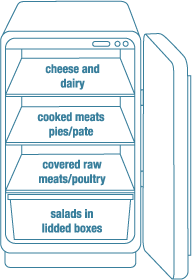You open your fridge and you find a milk bottle. It’s April 28 and the expiry date is April 26. You open it to check it. It appears good with no signs of mold and no “vinegar” smell. But is this the proper way of checking its safety? Read the date again. Did the milk actually get spoiled? Or is the date merely a safety margin? How will you know that the milk really got spoiled?
Food safety experts explain all the time about shelf-life of food, proper storage, and what expiration dates, and lot codes means to you.
“Shelf Life” is the time it remains safe for consumption before it gets spoiled. Spoilage is affected by countless reasons, mainly air, light, sun, bacteria, heat, humidity, storage temperature, and packaging material.
What are those stamped codes ?
• Lot Code: Manufacturing products come in batches, where each batch has a unique series f numbers that allow the manufacturer to tract any problem or defect that occur later and thus allowing them to be recalled from the market.
• Expiration Dates: These are the dates that should concern the consumer and serve him as a guideline to know when the product is either no longer safe to eat or might not taste as good as it did when originally produced.
The expiration dates are of three types:
• "Sell by" is for the stores to know how long it can display a product for people to buy.
• The "best before" or "best if used by" date indicates the time that a certain quality or flavor of food starts to deteriorate. But the food still remains safe to consume even after this time.
• "Use by" works is like the expiration date of medicines. Thus, consuming the food after this date is not recommended, as they may lose nutrients, potentially harmful bacteria might develop and the quality gets impaired.
Quick Tips for storing food
If you liked this post, you might also enjoy reading:
Food safety experts explain all the time about shelf-life of food, proper storage, and what expiration dates, and lot codes means to you.
“Shelf Life” is the time it remains safe for consumption before it gets spoiled. Spoilage is affected by countless reasons, mainly air, light, sun, bacteria, heat, humidity, storage temperature, and packaging material.
What are those stamped codes ?
• Lot Code: Manufacturing products come in batches, where each batch has a unique series f numbers that allow the manufacturer to tract any problem or defect that occur later and thus allowing them to be recalled from the market.
• Expiration Dates: These are the dates that should concern the consumer and serve him as a guideline to know when the product is either no longer safe to eat or might not taste as good as it did when originally produced.
The expiration dates are of three types:
• "Sell by" is for the stores to know how long it can display a product for people to buy.
• The "best before" or "best if used by" date indicates the time that a certain quality or flavor of food starts to deteriorate. But the food still remains safe to consume even after this time.
• "Use by" works is like the expiration date of medicines. Thus, consuming the food after this date is not recommended, as they may lose nutrients, potentially harmful bacteria might develop and the quality gets impaired.
- It is recommended to check for dents, tears or broken seals in the product. Don’t buy it if you found these defects because even if the date is still safe, the packaging is supposed to be designed in a way to maintain the food. For example, can’s bulging is an indication of bacterial growth.
- Keep your cans away from humidity, air or light. Keep them in a stored closet.
- Foods with short shelf life don’t need numbers. It is advised when purchasing perishable food, such as meat, poultry, dairy products, and some fruits and vegetables, to bring them home quickly and refrigerate. But if you don’t want to cook the meat, poultry or sea food, store them in the freezer within two days of buying it to avoid their spoilage. Despite the fact that freezing ensures that food remains safe, it can affect its taste after defrosting.
- Meat and poultry can last 6 months in the freezer, but the taste will be compromised.
( For the shelf life of other food, check this Ultimate Shelf life guide: Keep it or toss it? from sill tasty website) - Your refrigerator should register at 40° F (4° C) or below and the freezer unit at 0° F (-18° C).
- Hot food won't harm your refrigerator, so it's okay to place hot food inside. Be sure to divide large amounts of leftovers into shallow containers for quicker cooling in the refrigerator. Marinate foods in the refrigerator - not at room temperature.
- Don't pack the refrigerator too full with food. Cold air must circulate to keep food safe. More on food storage guidelines here From what's cooking America?
 |
| How should you put your food in the fridge to keep them lasting longer! |
8 . Herbs and Spices?
Whole Spices and Herbs- Leaves and flowers — 1 year
- Seeds and barks — over 2 years
- Roots — over 2 years
- Leaves — 6 months
- Seeds and barks — 6 months
- Roots — 1 year
In the end, it’s your own mindfulness and knowledge that will make your food safe to eat. Don’t rely on governmental regulations, whether in Lebanon or USA, as they are usually diminutive regarding these expiration dates.
If you liked this post, you might also enjoy reading:


No comments:
Post a Comment